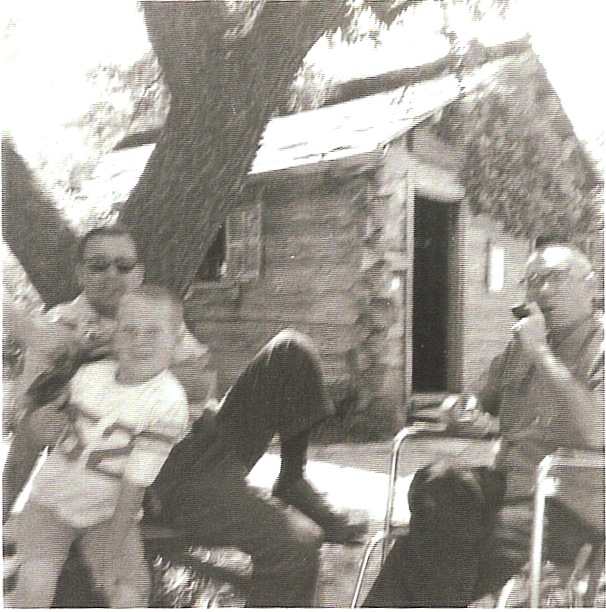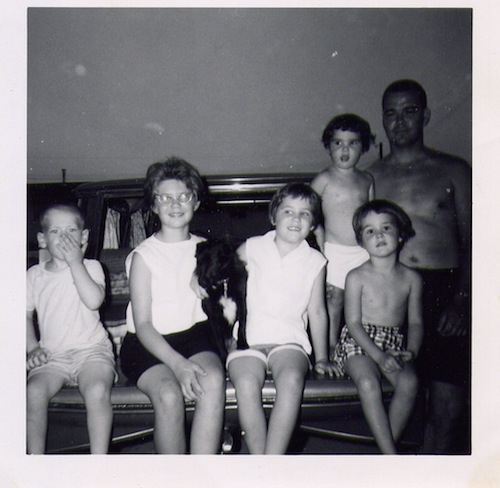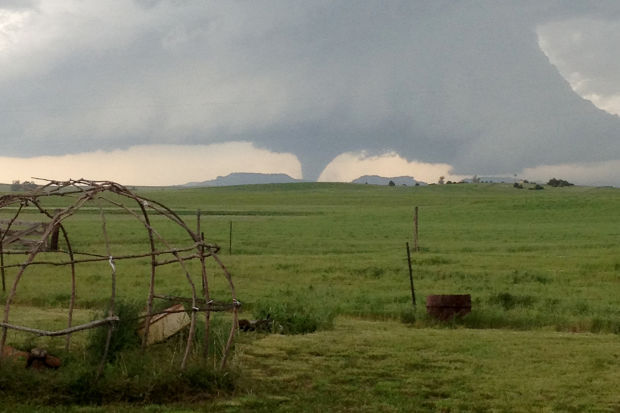
by jphilo | Sep 22, 2014 | Reflections on the Past

John, Jim, and Dad with the pipe that didn’t fall in the lake
The first half of Good Cheap Fun appeared on the Gravel Road way back in August. Today, you can finally read the second half of the excerpt from Lessons From My Father. As has been mentioned, this tale of vacation woe is packed with more catastrophe than a person can bear at one sitting. But if you want to risk it, Part 1 can be found here. And now, for the rest of the story…
At daybreak we slowly straggled into the kitchen, weary and welted, serious damage having been inflicted upon us during the night. Dad wheeled himself in. “Mornin’, everybody. Hope you all slept as well as I did. Wuddin’ it great to hear those cows mooin’ in the night?”
Despondent, nearly mutinous faces turned toward him.
Dorothy and Donna handed bowls around and placed boxes of cereal on the table. “What is that smell?” Mom asked, her eyes watering slightly. She sniffed me, then Julie, then Gail. “You all smell funny, like…”
“Like wet, ol’ mattresses full a dried pee,” Julie finished her sentence. “We’re real stinky.”
“Don’t worry,” Jim assured us. “We’ll be outside soon. There’s a real nice breeze. You can take soap and a washcloth into the lake when ya swim and get cleaned up. The good news is that the wind has skedaddled the mosquitoes, at least for now. Donna, where’s the key to the boathouse?” As Donna handed him the key, we slurped down our cereal, eager to witness the opening of the marine treasure trove.
We formed a merry caravan as we skipped our way across the yard. Dad, pushed by Jim, led the way, followed by six cavorting youngsters. The cavorting ended when John discovered the cattle had done more than just moo during the night. We picked our way daintily through their cunningly deposited land mines. Jim wheeled Dad to the shoreline near the boathouse, so he could supervise the water activities. Hastily, Jim braked the wheelchair while Dad pulled out his pipe and filled it. Dad was ready for the first smoke of the day, intent on enjoying the experience, enhanced as it was by the morning air, delicately laced with the aroma of fresh land mines.
Jim headed for the boathouse, key in hand. He inserted the lock and tried to turn it. Nothing happened. “Must be the wrong key,” he assured us. He headed back to the house to confer with Donna, but returned quickly. “It’s the right key. The lock must be a bit rusty. Why don’t you kids find a nice place to wade while I work on this a little?”
We wandered off. I spotted a particularly alluring bit of beach, overhung by leafy trees. The sun was getting hot, and the air was humid. I walked along the beach, heading for the shady spot. The sand turned to mud as I approached the shade. Enjoying the coolness, I waded back and forth, watching my feet stir up little muddy tornadoes under the water.
Eventually, the mosquitoes zeroed in on me, and I headed back up the beach where the others were waiting. I looked down and noticed blobs of mud clinging to my legs. I stepped in the water to wash them off, but they wouldn’t budge. I ran over to the others who were playing in the sand.
“Jill,” I said, “I can’t get this mud off my legs.” She bent down for a closer look.
“That’s not mud,” she informed me. “Those are leeches.” She reached down and took hold of one, pulling it out longer and longer, unable to break the powerful attachment between me and my blood-thirsty friend.
“EVERYBODY OUT’A THE WATER,” I screamed at the top of my lungs. “RUN FOR YOUR LIVES. THIS LAKE IS FULL’A LEECHES! GET OUT, GET OUT!” Then I ran, flailing and screaming, toward the house. “HELP, MOM, HELP! I GOT LEECHES ALL OVER ME! I’M GONNA DIE!” Being a child of slightly dramatic nature, I may have overreacted just a bit.
Mom came to the door with the salt shaker in hand. She had seen African Queen, so she knew what to do. Aunt Donna, looking only slightly less green than I felt, made a beeline down to the lake.
“Everybody, out,” she ordered. “This lake is full of leeches. You won’t be able to swim after all.” Groans and even tears greeted her announcement, but she held firm. “We don’t have enough salt,” she explained. “But,” she tried to comfort everyone, “you can still go out in the boats.”
They ran to the boathouse to check on Jim’s progress. There wasn’t any.
“This lock is rusted solid,” he explained. Everyone bent close to look. “Never seen anything like it. Guess we won’t be going boating.”
A wail of disappointment erupted. The noise made Mom and me look up from my mosquito-welted, leech-infested, salt-encrusted, pee-stinky little body. A movement caught my eye, and I noticed that Dad seemed to be inching toward the water as he savored his pipe. He seemed oblivious of his progress. I thought it was one of his jokes. “Mom, look at Dad,” I giggled.
Mom took one look at Dad, his wheelchair gaining momentum. She dropped the salt shaker along with my leg and shouted with more lung power than I knew she possessed, “Jim, Harlan’s rolling into the lake!”
Jim jumped up, hurdled over the children around him, and sprinted towards the rolling chair. He grabbed hold of the wheelchair just as the top of Dad’s boots were swallowed by the lake, and his knees stared the same wet demise right in the eye. Jim yanked him back to safety. Dad’s pipe, jerked from his hand by the force of backward motion, formed a perfect arc as it sailed out of his hand, and splashed into the lake.
“Dorothy,” he said, his humor seeping away as the specter of nicotine withdrawal approached, “I didn’t bring another pipe. Whaddya say we give it up’n go home?” Water dripped from his pant legs and boots.
I kept my hand on the salt shaker, my eyes alert for any sign of leeches beneath his socks.
“Yeah, let’s go home,” Jill chimed in. “We can’t get to the boats, and cuz of Jolene, we can’t go swimmin’.”
“Look at the sky, Jim,” Donna pointed out. “It looks like it could storm.” Sure enough, clouds were building up in the southwest sky. “We don’t even have a radio to check the weather, and this cabin doesn’t have a basement.”
Danelle, John’s age-mate and usually the heartiest and most countrified of our young crew, trudged towards us from the outhouse and solemnly announced, “I used up the last black and white page. The rest of you are gonna hafta to use color.”
We started packing.
As we lurched our way down the rutted lane, the wind rose and the clouds grew darker, forcing us to close the car windows. The humidity increased inside, enhancing the pungent odor emanating from our unwashed bodies. Jill actually enjoyed her little trysts with the cattle gates, as each encounter allowed her to breath untainted air. When we reached the gravel road, the adults stopped the cars and emerged gasping for fresh air. After a quick pow wow, they decided that rather than head all the way to Le Mars, they would drive to Pipestone, where we could be hosed down before spending the night with Grandma and Grandpa Hess. Taking a few last, deep breaths, they entered into the vehicles and drove at a rate I am guessing was more than a little above the speed limit.
We got to Pipestone in record time. Grandma was surprised to see us and after one whiff sent the children off in sets of three to the bathtub. “Use lots of soap and wash your hair,” she advised. She didn’t need to remind us to wipe with toilet paper and flush the stool when we were done. The pleasure was all ours. While we gloried in modern plumbing, the adults hung the sleeping bags on the line to air.
We emerged from the bathtub, clean and shining, wet-haired, and clothed in pajamas from Grandma’s famous pajama drawer, our own sleepwear enjoying a quick spin in the washing machine. After a blessedly mosquito-free supper, we discovered we were exhausted, with lack of sleep and disappointment bearing down upon our eyelids. Grandma made up beds for us on the furniture and on the floor and in the basement. We children hit the hay immediately, listening to the talk and the laughter drifting in from the breezeway as the adults recounted the events of the day.
Just as sleep claimed me, the phone rang. Hands shook me awake and urgent voices ordered me to hurry to the basement. “Tornado,” I heard someone say. I grabbed my pillow and blanket and headed for the basement, following the rest of the children. The adults came behind us, Jim and Mom bringing up the rear, as they took what seemed like an eternity to maneuver Dad and his wheelchair down the narrow stairs. Grandpa switched on the radio, and we listened to its nearly unintelligible crackle as we sat on the basement floor.
Dad surveyed the room, his eyes bright and his grin wide, if a bit forced, due to lack of nicotine. “Boy, I’m sure glad this vacation was free,” he said. “I’d hate to pay good money for a weekend like this.”
“Now, Harlan,” Mom begged, her eyes wet. “Don’t start.”
“Don’t start…what?” he demanded. Mom jerked a slight nod in the direction of Aunt Donna, who was blinking back tears.
“This weekend was supposed to be so fun,” Donna’s voice quavered. “Instead, it was a disaster.”
“At least we got out of the cabin before the tornado,” Jim comforted her. “We’re all safe and sound. And Harlan’s right, at least it was free.”
Dad cleared his throat and spoke again. “Well, not quite. Somebody owes me a pipe.”
We all began to laugh.
To this day, the Hoeys and the Strattons love to get together whenever we can, though we’ve learned to pay as we go. We’ve endured many adventures, but no other trip was as disaster-laden as our free weekend. That trip has become the measuring stick, the lodestone, the gauge to which all other disasters are compared. The truth of the matter is, while no other trip has been nearly so bad, no other trip ever provided as much laughter either. Dad did lose his pipe, but he gained a story that could make him laugh till he cried each time he told it.
“I sure hope,” he would end the story, “I sure hope there’s some dumb fish in that lake enjoyin’ a real good smoke.”

by jphilo | Aug 11, 2014 | Reflections on the Past

There’s just enough summer left for one more Lessons from my Father vacation story. This tale of vacation woe is packed with more catastrophe than a person can bear at one sitting. So this post contains the first half of the tale. Come back in about a month for the rest of the story.
Good, Cheap Fun
For indeed when we were with you,
we kept telling you in advance that we were going to suffer affliction;
and so it came to pass, as you know.
I Thessalonians 3: 4
“Head ‘em up, move ‘em out,” Uncle Jim crowed the words as the Stratton/Hoey party of ten crowded into two vehicles, ready to hit the road again. We were anticipating a weekend of pure enjoyment, two days of carefree existence, forty-eight hours of good, cheap fun. In fact, this adventure was cheaper than cheap. It was free.
An older couple in our church had told Aunt Donna about their lakeside cabin north of Willmar, Minnesota. They told her our families could use the cabin any weekend in the summer when they were not there.
“Dorothy, it’s free.” I could hear Donna’s excited voice in the kitchen. “Free! It’s a two-story cabin by a lake, with a private dock, and a boathouse stocked and ready for our use.”
“Donna, it sounds too good to be true. They don’t want us to pay anything?” Mom, a wise skeptic, knew there was no such thing as a free lunch.
“That’s what she said, Dorothy, absolutely free. They love to loan out their cabin to young families. Why they even gave me a guide book they’ve written up, pointing out sites of interest on the drive up.”
“Well, if you’re sure…”
“I’m sure. Grab your calendar. ”
Our weekend was scheduled and off we went, four adults and six active children ranging in age from three to twelve. We were ready for easy livin’, ready to catch our dinner in the well-stocked Lobster Lake, ready to dip those Minnesota walleye and northern pike in egg, roll ‘em in the cornmeal we’d brought along, ready to fry ‘em in the bacon grease stowed in the cooler which was packed in the trunk alongside our fishin’ gear, our swimming suits, and the picnic baskets. This weekend would be the stuff of memory, of legend, and it was free.
Jim drove the vehicle ahead of us while Dad kept him entertained. Neither made any effort to corral the three feisty children in the backseat. My mother drove our tan Plymouth at a safe distance behind the men’s car, my two traveling companions prospering under my loving and bossy care.
Eagerly, Donna read excerpts from the handwritten guide book while Dorothy steered us down the road. “As you travel north of La Verne, Minnesota, on Highway 75, keep looking west. You will see the Blue Mound Inn, a restaurant just recently established and quickly gaining a reputation as one of the area’s finest eateries.”
I swallowed my saliva as I looked out the window. Our car zoomed by the establishment; my hopes of a chance to sample the cuisine predictably dashed.
Anticipation of free lodging and food propelled our parents down the road that hot June day, and the detailed directions in the guide book led us from the state highway to a black-topped county road to a gravel road to a rusty mailbox guarding an overgrown and winding lane. The lane, rutted and narrow, led to a mangy grove, in the middle of which stood a derelict frame farmhouse, which at one time might have been painted white.
“According to the guide book, this has to be the lane. You will find a few cattle gates along the lane. Please shut the gates after you go through,” Donna read from the guide book again. “There’s a cattle gate, that’s for sure.” She peered down the dusky lane. “I guess the cabin must be between the old farmhouse and the lake.”
Both vehicles stopped, balking at the prospect of navigating the lane, which was doing a pretty good imitation of a miniature Grand Canyon. Donna hopped out to confer with Uncle Jim. He agreed, as Dad nodded approval, that indeed, the cabin must be on the far side of the old farmhouse. They assigned Jill, as oldest child, the honor of opening and shutting each gate along the way.
Donna got back into the Plymouth, and Dorothy and Jim drove carefully, avoiding the precarious ruts in the lane. Numerous halts, due to the countless gates, slowed our progress and left Jill cursing her dumb luck as oldest of our young generation. As our cars rounded the farmhouse, we were rewarded with a breath-taking view of the lake. We spied a boathouse and a fragile-looking dock, but the two-story cabin of our imaginations escaped detection. The farmhouse, however, did have two stories, the higher of the two listing a good six inches closer to the lake than did the lower one.
“You don’t suppose…” Mom’s unwelcome thought trailed off.
“No, this couldn’t be it.” Donna finished the thought. “We must have made a wrong turn. I’ll just go try the key before we head down that lane again.”
Donna marched to the screen door and yanked. It wouldn’t budge. She peered closer and spied a hook latching the door securely from the inside. A key was of little use here. Donna executed a neat about face and headed back to explain the situation.
“Lemme take a look,” Jim suggested. He went to the door and rattled the knob. It held firm. He examined the window near the door and worked a small section of its rusty screen loose. He managed to open the splintery window sash, but there was no way his body would fit through the small hole he had created. “Donna, send Julie-bug up here. She’s small enough to crawl through, I think.”
Julie, nearly overcome by the importance of her assignment, straightened her young shoulders, and walked solemnly to fulfill it. Uncle Jim lifted her and squeezed her through the opening, pulling back on the screen as she squirmed her way in. Julie opened the kitchen door and then unhooked the screen, emerging from within victorious. Donna put the key in the lock, sure it wouldn’t fit. Unfortunately, it did. The summer cabin of our dreams suddenly became a nightmare.
Donna walked through the door and, to her credit, did not faint as she surveyed the amenities of our free digs. My mother clung to consciousness also, which was good, as she was still at the wheel, parking the car in the least overgrown patch of lawn she could find. Uncle Jim managed a weak grin as he ran back to his car and pulled it in place beside her. Dad, taken aback by his first view of our palatial accommodations, began laughing so hard he couldn’t gasp out a snappy comment. We young ones, having waited patiently for at least five miles of the approximately 175 mile trip, could be patient no longer. We poured out of the car, falling over one another in our haste, ready to race to the lake.
“You kids be careful,” Mom yelled as she got out of the car. “Come back here for a minute.” Normally, we would have ignored her instructions and headed straight for the water, but the overgrown lawn impeded our progress, and the squadron of Kamikaze mosquitoes guarding the lake drove us back.
“Head for the house,” Jim barked the order, and we obeyed. We flew into the house and slammed the door, slapping at the enemy pilots invading the kitchen.
“I gotta go…bad!” John spit out a few mosquitoes as he spoke. He headed through the house on a whirlwind mission to locate the facilities. Seconds later, he returned to the kitchen with a puzzled and desperate look on his face. “I can’t find the bathroom.”
As he spoke, the door opened. Uncle Jim wheeled Dad in. A formation of fighter mosquitoes accompanied them. “Johny, the bathroom is outside. I spied the outhouse in the grove,” Dad said.
“An outhouse!” Mom exclaimed. “Donna, did you pack toilet paper?”
“No,” Donna’s voice wavered.
“Neither did I.”
As John danced painfully, Jim looked him in the eye. “John, be a man and be the first to test the facilities. Just pray for a Sears catalog. And don’t dawdle. The skeeters will carry you off if you aren’t careful.”
John pushed his way through the door and soldiered bravely through the yard to the outhouse leaning precariously in a shadowy corner of the grove. An honor guard of mosquitoes escorted him to his appointed task.
While John inspected the outbuildings, we girls completed a reconnaissance mission through the interior of the estate. We found a living room and dining room off the kitchen as well as one bedroom on the first floor. The bedroom held an iron bedstead, a greyish water-stained mattress stunningly setting off the set of rusty springs upon which it laid.
We tore up the stairs, oblivious of the wallpaper peeling off the ceilings and walls, dangling just above our little heads. We found three more bedrooms, the decorating motif of each strikingly similar to that of the main floor bedroom, although some mattresses were a tri-colored mix of grey water stains tastefully swirled among yellow urine patches and streaks of dried brown blood. Astute observers that we were, we noticed the musty odor pervading each room, amplified by the stifling temperature on the second floor. We paired up and wrestled open the warped sashes of the double-hung windows in each room, letting the cool, grass-scented evening air rush in. Then we headed down to the kitchen to report what we had discovered.
“Girls, that’s great,” Aunt Donna complimented us. “We’ll bring suitcases and sleeping bags in right after supper. Why don’t you all set the table while Dorothy and I mix up the tuna salad for sandwiches. One of you, grab the fly swatter and keep at the mosquitoes.”
With our expert help, supper was ready in a flash, and we all gathered hungrily at the kitchen table. After a remarkably short grace, punctuated by hands slapping at the dive bombers buzzing around us, we dug in.
“These bugs are getting worse,” exclaimed Donna. “Is the door shut all the way?”
“It sure is.” Jim got up to double check.
“Where in the world are they coming from?” Mom wondered. “Girls, was there a hole in one of the bedroom screens?”
“Nope,” Jill was positive.
“Are you sure, Jill?”
“‘Course I’m sure. I’m no baby.” She was indignant.
“How can you be so sure?” Dad took over the questioning.
Jill sat up very straight, swallowed one last mouthful of sandwich, slapped at the insect imbibing her life blood, then paused for dramatic effect. “I’m sure,” she intoned with great dignity, “cuz there were no screens.”
“No screens,” Mom echoed. She rushed out of the room and up the stairs, followed by Jim and Donna. Above us we heard window sashes banging down. Dad sat in his chair, trying to chew and laugh without spewing masticated tuna fish all over the table. He picked up his napkin and wiped the tears from his eyes.
The other adults returned to the room, clouds of buzzing biters creating an interesting halo effect around their heads.
“That takes care a that.” Jim broke the next bit of news gently. “Kids, the mosquitoes are just too thick out there tonight. We’ll have to hold off on swimmin’ ‘til tomorrow.”
We pleaded with him to no avail. The enemy agents circled outside the walls, and we were condemned to an evening inside our free summer cabin.
Putting a good face on it, Jim reasoned with us. “We’ll go to bed early, get up at the crack of dawn, and be in the boats all mornin’. Now, who’s gonna brave the outdoors and help me bring in the suitcases?” Outnumbered by merciless, winged warriors, we valiantly managed to unpack the cars in record time.
Sleep eluded us that night, trapped, as we were, in a war zone. Enemy agents conducted relentless attacks, engines buzzing overhead unceasingly. At some point in the night, cattle wandered into the yard. Their moos serenaded us, mingling with the aerial drills above us, driving away any hope of sleep. The upstairs bedrooms, with windows tightly shut, retained heat remarkably well. The hordes of fighter jets stirred the stuffy air not at all. We faced a conundrum. Should we throw off the heavy sleeping bags and leave ourselves vulnerable to enemy attack or burrow into the bags and die of overheating? Anxiously, we awaited the crack of dawn.
If you liked what you read, come back on September 15 for Part 2 of Good, Cheap Fun.

by jphilo | Jul 14, 2014 | Mystery Update

This mystery novel update contains some good news and some bad news. Let’s start with the good news. This update comes only a little over a month after the last one. Since they previously came every two months, the pace has picked up considerably.
Too bad the same can’t be said for the progress of the novel itself.
Which is, as you may have guessed, the bad news. If only the lack of progress could be blamed on the June 19 EF–3 tornado that hit southeastern Montana, just a few miles west of the fictional setting of the novel. But since the novel is set in 1977 and the tornado hit just a few weeks ago, that excuse doesn’t quite work. In reality, the lack of progress is due to a great deal of summer fun: visits to and from family members, family weddings, class reunions, and the like. Activities of which Jane heartily approves.
You remember Jane?
She’s the elementary school teacher protagonist of our story. In the last update, she’d been too busy mastering the arts of cow milking, chicken feeding, aiding and abetting criminals across state lines, and outrunning bulls to complete report cards or prepare for parent–teacher conferences.
Since then, she’s straightened out her priorities.
The report cards are done, though the “deportment” section led to a great deal of head-scratching and the realization that her own marks in that department have been and continue to be less than stellar.
Jane, Jane, Jane, Jane, Jane.
The sad state of affairs between Jane and her fellow teacher, Liv, have been resolved. The sad state of Jane’s relationship with the grumpy school janitor have come to a head. And the sad state of Jane’s love life, due to the consequences of some choices she’s made and her inability to light the pilot light on her stove, lead to a couple realization. First, elementary safety scissors don’t lend themselves to self-defense.
Second, glitter can be a woman’s best friend.
Jane’s way too busy to explain the glitter thing. She and the whole town are gearing up for the Methodist Church Bazaar. The church’ll be filled to bursting with a huge crowd, good food, a country store, a big auction, and Jane working the fishing booth.
A perfect recipe for disaster.
And a recipe that may have to wait a few weeks to be tested. Because the priority for July and August is writing the rough draft of a contracted book about PTSD in Children. Unless I meet those weekly goals before noon on Fridays. In which case, Jane will become my Friday afternoon priority, and we will ride off together into a glittery western sunset.
With absolutely no tornadoes allowed.





